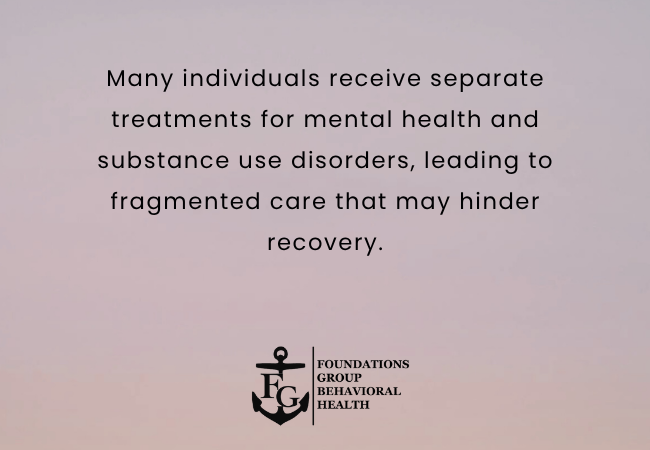Dual diagnosis refers to the condition of having both a mental health disorder and a substance use disorder simultaneously. These co-occurring disorders complicate treatment but can be successfully addressed with integrated care strategies, including the essential component of medication management. In this article, we will explore how medication management plays a crucial role in dual diagnosis treatment, emphasizing the delicate balance between managing symptoms, reducing side effects, and supporting long-term recovery.
Understanding Dual Diagnosis
A dual diagnosis can involve various mental health conditions, including anxiety disorders, depression, PTSD, bipolar disorder, and more. When someone struggles with both mental health issues and substance use, it complicates the treatment process. The substance may be used as a form of self-medication to cope with mental health symptoms, but in reality, it often exacerbates the problem.
For example, individuals with anxiety disorders may turn to alcohol or illicit drugs to alleviate the constant nervousness or fear they experience. However, over time, substance use can worsen anxiety and lead to additional complications, such as addiction, health issues, and relationship difficulties.
The treatment of dual diagnosis requires a holistic approach that integrates both psychiatric care and addiction treatment. This comprehensive model of care ensures that both disorders are treated simultaneously, addressing the complex interplay between substance use and mental health symptoms.
The Role of Medication Management
In dual diagnosis treatment, medication management is a critical aspect of ensuring that individuals receive the appropriate pharmacological support to stabilize their conditions. Medication management for dual diagnosis treatment involves prescribing medications to manage both the mental health disorder and substance use disorder. The goal is to use medications in a way that helps individuals maintain mental stability while supporting their long-term recovery from addiction.
Medication management serves several purposes:
- Stabilizing Symptoms
Medications are used to address the symptoms of both mental health and substance use disorders. For example, if an individual is diagnosed with anxiety and alcoholism, anxiety medications such as selective serotonin reuptake inhibitors (SSRIs) may be prescribed, while medications to manage alcohol cravings, such as disulfiram or acamprosate, may also be utilized. - Reducing Relapse Risk
Medication can help reduce the risk of relapse by stabilizing brain chemistry and mood regulation. Proper medication management can minimize the likelihood that a person will return to substance use as a way to cope with their symptoms, whether those symptoms are related to trauma, depression, or another mental health issue. - Minimizing Side Effects
Medications can often cause side effects. With medication management, the goal is to find the right combination of drugs that provide therapeutic benefits without unwanted side effects. Proper monitoring of medication regimens ensures that any adverse effects are identified early and adjustments can be made. - Improving Treatment Adherence
Adherence to a treatment plan is essential for successful recovery. When medication is tailored to the individual’s needs, side effects are minimized, and the individual is more likely to stick to their treatment regimen. This enhances the chances of long-term success in dual diagnosis recovery. - Personalizing Care
Not all individuals respond to medications in the same way. Personalized medication management means adjusting treatments according to the individual’s specific symptoms, medical history, and other factors, ensuring that each person receives the most effective treatment for their unique needs.
Integrating Medication Management with Therapy
Medication management alone is rarely sufficient for long-term recovery, especially in dual diagnosis cases. Integrated care, which combines medication with therapy, is essential for addressing the underlying causes of both the mental health disorder and the substance use disorder. Therapy helps individuals develop coping strategies, build self-awareness, and address the emotional and psychological factors that contribute to their dual diagnosis.
One crucial component of integrated care is Outpatient Mental Health Therapy Massachusetts. Outpatient therapy allows individuals to receive counseling while continuing to live at home, work, and maintain their daily routines. This flexibility makes therapy an accessible option for many individuals who are working through their dual diagnosis.
Additionally, Trauma Disorder Treatment Program Massachusetts is often an essential part of dual diagnosis care. Trauma is a common underlying factor in both substance abuse and mental health disorders. For many individuals, addressing past trauma is key to recovery. Therapy that focuses on trauma, such as trauma-focused cognitive behavioral therapy (TF-CBT), can help individuals process and heal from traumatic experiences while learning healthier coping mechanisms.
Combining medication management with therapeutic interventions like Mental Health Treatment Programs Massachusetts ensures that individuals receive the comprehensive care they need to manage both their mental health and addiction.
Medications for Mental Health and Addiction
There are a variety of medications commonly used in dual diagnosis treatment plans to address both mental health and substance use disorders. These medications include:
- Antidepressants: Used to treat mood disorders like depression and anxiety, antidepressants are commonly prescribed for individuals with co-occurring disorders.
- Anti-anxiety medications: Medications like benzodiazepines may be prescribed for short-term relief of acute anxiety symptoms. However, for individuals with dual diagnosis, they are often used cautiously to avoid the risk of dependence.
- Mood stabilizers: For individuals with bipolar disorder, mood stabilizers help to prevent mood swings and maintain emotional balance.
- Antipsychotics: These are used to treat more severe mental health conditions such as schizophrenia or psychosis.
- Medications for addiction: In addition to medications for mental health conditions, medications for addiction treatment, such as methadone, buprenorphine, or naltrexone, may be prescribed to manage cravings and withdrawal symptoms.
Each medication plays a specific role in the recovery process, and the goal is to balance these medications to optimize the patient’s ability to heal.

The Importance of Continuous Monitoring
Since dual diagnosis involves complex interactions between substance use and mental health, continuous monitoring of medication effectiveness and side effects is essential. Regular follow-ups with the treatment team allow for adjustments to the medication regimen as necessary. For example, if a patient experiences side effects from an antidepressant, the doctor may adjust the dosage or switch to a different medication.
Monitoring also helps identify any emerging issues, such as new substance use or worsening mental health symptoms, so that the treatment plan can be adjusted promptly. This ongoing care ensures that the individual is always receiving the best possible treatment for their specific needs.
Combining Medication Management with Comprehensive Care
In dual diagnosis treatment, medication management should be part of a larger, comprehensive treatment plan. Anxiety Treatment Program Massachusetts is one example of a specialized program that may be included in a dual diagnosis care plan. This program focuses on treating anxiety disorders with a combination of therapy and medication. By addressing the anxiety symptoms directly, individuals are better able to manage their emotions and reduce the need for self-medication through substances.
Additionally, a Behavioral Health Treatment Center Massachusetts plays a vital role in treating dual diagnosis. A behavioral health center provides a range of services, including individual therapy, group therapy, and family therapy. These services are essential for supporting recovery and helping individuals develop healthier ways to cope with stress, emotions, and triggers.
Why Choose Foundations Group Behavioral Health?
At Foundations Group Behavioral Health, we understand the complexity of dual diagnosis and the need for a holistic, integrated approach. Our Mental Health Treatment Programs Massachusetts are designed to address both mental health and addiction, providing individuals with the comprehensive care they need for long-term recovery. Our expert team of psychiatrists, therapists, and addiction specialists works together to create personalized treatment plans that incorporate medication management, therapy, and support.
We believe in treating the whole person, not just the symptoms, and our goal is to help individuals regain control of their lives. Whether you are dealing with trauma, anxiety, or other mental health challenges, we are here to provide the care and support you need to heal.
Conclusion
Managing dual diagnosis requires a multi-faceted approach, with medication management playing an essential role in stabilizing symptoms and reducing the risk of relapse. When paired with therapy and other support services, medication can help individuals achieve lasting recovery and build a fulfilling life free from addiction and mental health struggles. If you or a loved one is struggling with dual diagnosis, reach out to Foundations Group Behavioral Health today at (833) 986-2594 for the help and support you need.
Frequently Asked Questions (FAQs)
What is medication management in dual diagnosis treatment?
Medication management is the ongoing process of prescribing, monitoring, and adjusting psychiatric medications for individuals dealing with both a mental health condition and a substance use disorder. It ensures medications are effective, safe, and tailored to each patient’s needs.
Why is medication management important for dual diagnosis?
Medication management helps reduce psychiatric symptoms, support emotional regulation, and reduce relapse risk. In dual diagnosis, it plays a critical role in treating both mental illness and addiction concurrently.
Who provides medication management in dual diagnosis care?
Psychiatrists and psychiatric nurse practitioners typically oversee medication management. They collaborate closely with therapists and addiction specialists to monitor progress and adjust medications as needed.
Can medication help with both addiction and mental health symptoms?
Yes, certain medications can support both aspects of a dual diagnosis. For example, mood stabilizers or antidepressants can help reduce cravings while also treating depression or anxiety.
Is medication management part of all dual diagnosis treatment programs?
While many dual diagnosis programs include medication management, the approach can vary depending on the treatment center and the individual’s specific diagnosis and needs. At Foundations Group Behavioral Health, it is a core component of care.








